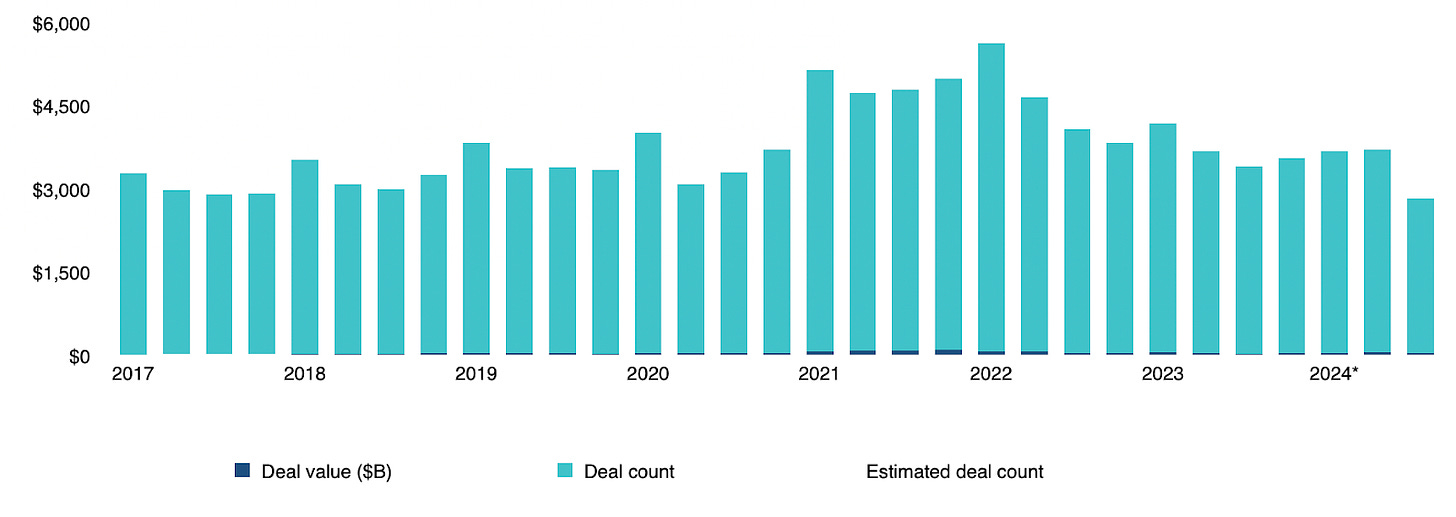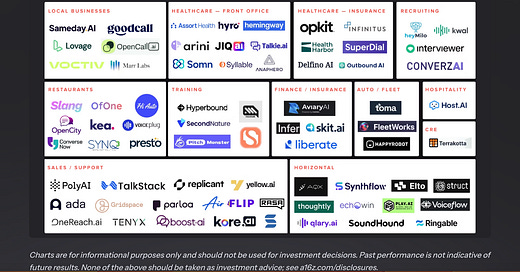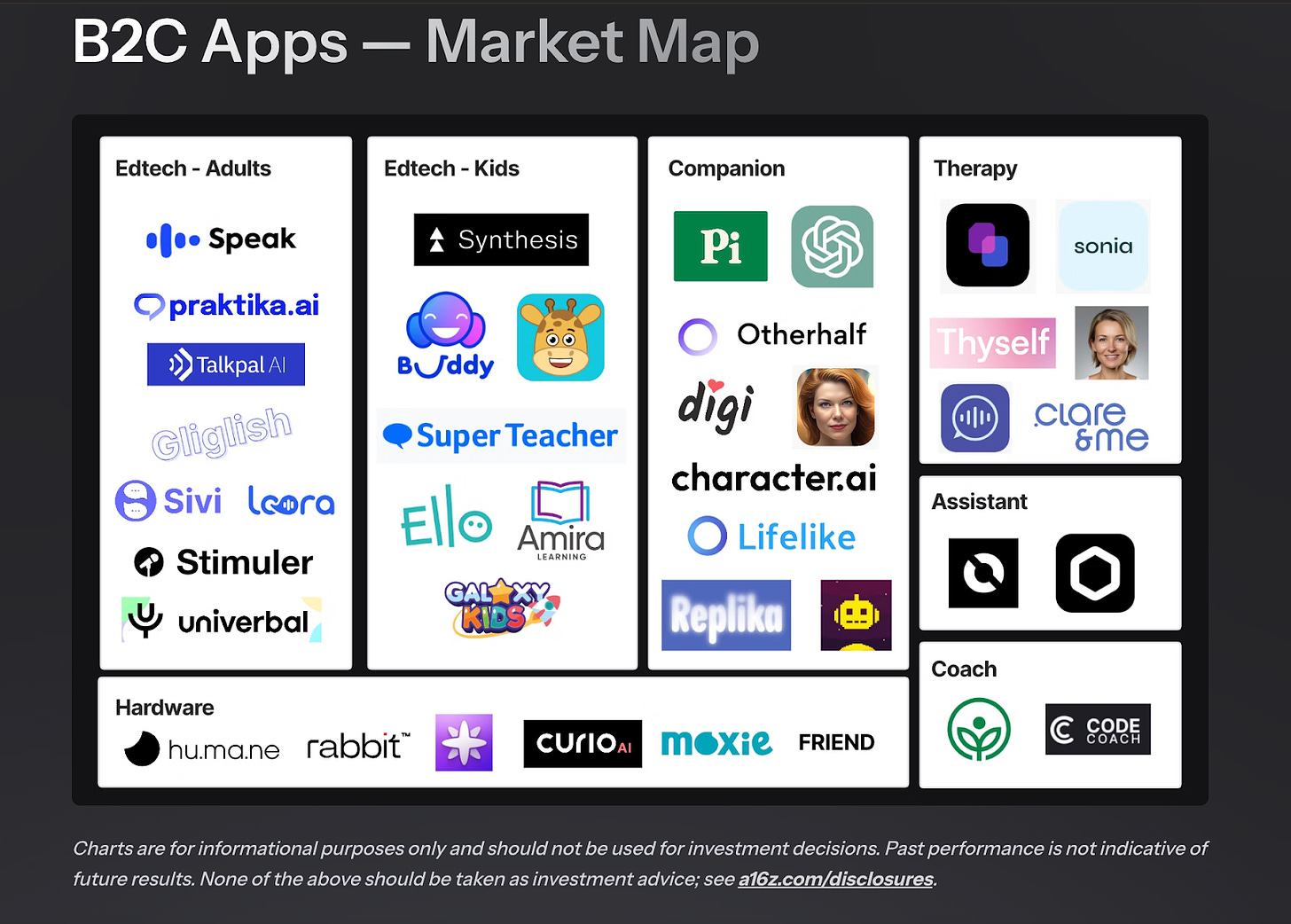VCs Bet on Translation & Voice Startups...OpenAI Closes Largest VC Round Ever...Q3 Deal Count Decline
Plus, an update to last week's open-source debate
The Main Item
Translation & Voice Startups Test the Reach of AI Giants
With OpenAI launching the latest version of its translation model along with the DevDay launch of Advanced Voice Mode for ChatGPT this week, a host of startups will be under pressure to show that their offerings are special enough to compete with large, well-funded general-purpose AI models.
Language translation technology, which was progressing rapidly even before the generative AI mania, could be an early test-case. Germany’s DeepL, which uses its own specialized LLM for text translation between languages, says testers consistently prefer its results over Google Translate and ChatGPT, and claims 100,000 enterprise and government customers. The company raised $300 million this spring from tier-one VCs led by Index, and just opened an office in New York.
Its secret sauce, DeepL founder and CEO Jarek Kutylowski told me, is people: the company uses thousands of human translators to perform quality checks.
“It is incredibly important to have that human input to training the AI, otherwise we would not be able to achieve these quality levels,” Kutylowksi told me. Voice capabilities are also a potential area for development, though he wouldn’t give a timeline.
At the other end of the translation startup spectrum, seed-stage Useful Sensors is building a translation engine that doesn’t connect to outside networks at all, and instead uses the Qualcomm NPU chips inside Microsoft Surface tablets to convert them into voice-to-text translators for in-person conversations.
By staying on-device, the translation can happen much faster than if the tools were connected to remote data centers, Useful Sensors founder Pete Warden told me. It also adds a layer of privacy and security for customers, many of whom are immigration lawyers or government agencies. That approach could bring us a little closer to the fish-in-the-ear translator of Hitchhiker’s Guide to the Galaxy, albeit with a large sacrifice in accuracy.
Some AI voice-generation startups that have raised large VC rounds also offer translation as a feature, or use it as a building block. ElevenLabs, for example, a voice-cloning company backed by a host of Silicon Valley heavy-hitters, including a16z, Sequoia, and Nat Friedman and Daniel Gross, offers voice-dubbing in other languages.
The consumer-focused language learning startup Speak, which raised a Series B-3 round in July at a $500 million valuation, lets users talk back and forth with an AI language tutor. Many startups are building on top of the big foundation models: Speak, for example, uses OpenAI’s API, although ElevenLabs makes its own voice models.
Outside of translation, the broader world of voice AI agents is booming, with customer service agents for call centers getting early traction. It’s still very early in this race–useful AI customer service agents remain rare in the wild—and VCs see promise in various parts of the stack. Two investors mentioned Retell AI, which launched out of YC this year and has raised $4.6 million in a seed round led by Alt Capital, as a promising seed-stage voice startup. It’s aimed at the call center market, enabling developers to build and deploy voice AI tools on one platform.
With ChatGPT currently capturing so much mind-share and market-share, and inevitably facing pressure to justify its massive valuation, it’s not hard to see a scenario where it moves to build its own more specialized voice and translation offerings.
But the sheer number and variety of voice agent startups, most targeting industry verticals, suggests that VC’s are undeterred. A16z’s Olivia Moore and Anish Acharya put together a market map of AI voice tools in both consumer and enterprise this spring, and they’ve graciously agreed to share it below:
CVAI
Apply to Attend the Cerebral Valley AI Summit
The Cerebral Valley AI Summit is back!
We’re hosting the elite summit for AI founders and investors on Wednesday, November 20, in San Francisco.
Our lineup includes industry leaders like Anthropic’s Dario Amodei, Databricks’ Ali Ghodsi, and Scale AI’s Alexandr Wang.
The one-day event is invite-only, and you can apply to attend here. Spots are filling fast.
If you have any other questions about the event, email newcomer@newcomer.co.
Open-Sourcing Strife
WordPress Lawsuit and YC Tweetstorms Stir Open Source Debate
The open source controversy we touched on last week continued to rage as WP Engine sued Automattic CEO and WordPress developer Matt Mullenweg, accusing them of breaking their promise to run open-source WordPress projects free of constraints or interference.
“Matt Mullenweg and Automattic’s self-proclaimed scorched earth campaign against WP Engine has harmed not just our company, but the entire WordPress ecosystem,” a spokesperson for WP Engine said in a statement. The company alleges Automattic demanded 8% of its gross revenues per month as a royalty fee, and wanted to bar the forking of plug-ins and extensions, among other misdeeds.
Automattic says that’s nonsense, calling WP Engine’s allegations “gross mischaracterizations of reality” and promising to pursue all remedies.
On Thursday, Mullenweg announced that many of his own employees were upset about his handling of the conflict with WP Engine. So, he wrote, he offered “the most generous buy-out package possible” and 159 employees, 8.4% of the company, took the offer.
It doesn’t sound like this one is settling anytime soon.
Open-source AI also made the spotlight on X last week with chatter around the new Y Combinator startup PearAI, whose growth-hackery launch we discussed in our latest Newcomer podcast episode. To catch you up, PearAI’s public launch drew accusations that its open-source code editor is simply a fork of Continue and VSCode without many new features. The founders more or less acknowledged this on Monday, although they list the additional features on their FAQ page. Questions remain on the defensibility of the business model. YC has backed multiple code-editor tools already, including Melty and Void. “More choice is good,” Garry Tan wrote in a reply.
On Thursday, Tan backtracked. He wrote, “Out of instinct to defend YC companies, I supported PearAI without knowing all the facts. In this case the criticism did have merit, and I worked with PearAI’s group partner and the founders to fix this situation.”
The WordPress battle could help determine whether forking is defensible as a business model in the AI era, whatever one might think about the ethics. We’ll be keeping our eyes peeled for any updates on this case.
One Big Chart
US Venture Deal Total Slips in Q3

US VC dealmaking saw its first quarter-over-quarter decline in a year, according to PitchBook’s NVCA Monitor Q3 First Look, though a handful of AI mega-rounds kept the median value high.
Just 2,795 deals closed during the quarter, Pitchbook reported, though its adjusted number, which estimates the number of deals not yet officially recorded, bumps the total up to 3,777. That’s still the lowest total since 2023.
These numbers don’t take into account any bump in dealmaking since the Federal Reserve cut interest rates in September, of course, since those effects will take a while to trickle down. Q3 historically has seen a summer slowdown, so an end-of-the-year flurry could still come for hungry startups soon.
But huge funding rounds for AI companies like Safe Superintelligence Inc. and Groq underscore the growing bifurcation between the big AI startups and everyone else, and don’t necessarily bode well for founders looking for the traditional 8-figure Series A or B.







